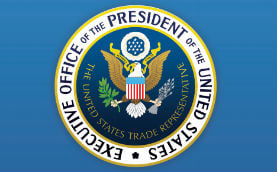 Every year, the US Trade Representative (USTR) issues an updated review of "Notorious Markets" that facilitate copyright infringement.
Every year, the US Trade Representative (USTR) issues an updated review of "Notorious Markets" that facilitate copyright infringement.
This overview is put together with help from copyright holders and is used to motivate the targets and foreign authorities to take action.
Historically, the online part of the list has been limited to "foreign" sites and services. These are often websites associated with piracy, such as The Pirate Bay, Uploaded, and Fmovies. However, the scope changed significantly this year.
US Tech Companies as Notorious Piracy Markets
In its latest request for comments, the USTR said it would focus on the role of third-party intermediaries. Not only that, the inquiry is no longer limited to foreign sites and services either, which is a clear deviation from earlier years.
Various copyright holders and industry organizations used this momentum to call out some of the largest tech US companies as notorious markets. They named Amazon, Facebook, Namecheap, Cloudflare, and many others. Needless to say, the accused were not happy.
This week many of these large tech companies responded to the allegations. Many of these rebuttals came in through trade organizations, such as the Computer & Communications Industry Association (CCIA), which represents Amazon, Facebook, and Cloudflare.
USTR Should Focus on Foreign Companies
The CCIA's reply doesn't go into detail regarding the various piracy-facilitating allegations that were made against its members. Instead, it argues that expanding the annual review to include US companies is inappropriate and goes beyond the USTR's mandate.
"In addition to straying beyond the purposes of the Notorious Markets report, the targeting of U.S. companies would exceed USTR's mandate," CCIA writes.
"USTR would compromise the effectiveness of the Notorious Markets report as a tool for identifying foreign markets of concern and for engagement with foreign trading partners if it were to focus in the Report on the practices of domestic U.S. companies," the group adds.
Facebook Opposes Nomination
Facebook also sent in an individual rebuttal summing up many of its efforts to combat piracy and counterfeiting. In addition, the company stresses that US companies should not be nominated for the notorious markets list.
The social media platform notes that the USTR's review process is meant to highlight inadequate enforcement and other copyright-related problems in foreign countries that harm US companies. Pointing the finger at US companies suggests that US policy is lacking.
"In this context, nominating Facebook, a U.S. company, represents an unwarranted criticism of the domestic U.S. IP enforcement system and reflects a fundamental misunderstanding of Special 301 as a trade tool," Facebook notes.
"It is unfortunate that a submission about a U.S. company should distract from USTR's important work in securing adequate and effective protection for intellectual property rights by U.S. trade partners," the company adds.
Amazon and Cloudflare Respond
Amazon also replied to its nomination, but the company focused more on countering the copyright infringement accusations. For example, Amazon stresses that it has zero tolerance for counterfeiting and piracy, while providing a detailed overview of its policies.
The same is true for Cloudflare. The company provides CDN services for millions of sites, which includes pirate sites as well. As a result, it has been frequently characterized as a piracy facilitator in recent years.
Some copyright holders, including the RIAA, accuse the company of "hosting" pirated content but the CDN provider rejects this accusation. It sees itself as a content-neutral intermediary that simply passes on bits and generally doesn't store anything permanently.
"We continue to be frustrated by RIAA's efforts to conflate 'hosting,' something we generally do not do and has distinct legal obligations under the DMCA, with providing CDN services, which have different legal obligations," Cloudflare notes.
Another accusation, that Cloudflare helps pirate sites to conceal their true hosting locations, is also disputed. Copyright holders can easily obtain the hosting company of any website by filling out a simple form.
In addition, the CDN provider also works with "trusted reporters" including the RIAA, MPA, and law enforcement authorities, who can easily obtain the IP-address of alleged pirate sites.
i2Coalition Defends Neutral Intermediaries
The final submission we want to highlight comes from i2Coalition, which represents several VPN companies, domain name services, CDN and hosting providers. These all risk being nominated if the USTR expands its scope.
While there may be some bad apples, i2Coalition reminds the USTR that many neutral intermediaries take online piracy seriously and should certainly not be seen as notorious markets.
"We urge USTR, in reviewing and distinguishing among the variety of service providers and other entities operating in online markets, to remember that neutral intermediaries are not notorious markets," i2Coalition writes.
The submissions make it clear that the tech companies are not happy with the direction the USTR is taking. Whether these rebuttals will prevent them from being listed in the upcoming notorious markets review remains to be seen.
In any case, the USTR's 2020 notorious markets list will be highly anticipated. Not just by copyright holders and tech companies either. Pirates may also find it useful, as a recent comment suggested.
From: TF, for the latest news on copyright battles, piracy and more.
No comments:
Post a Comment